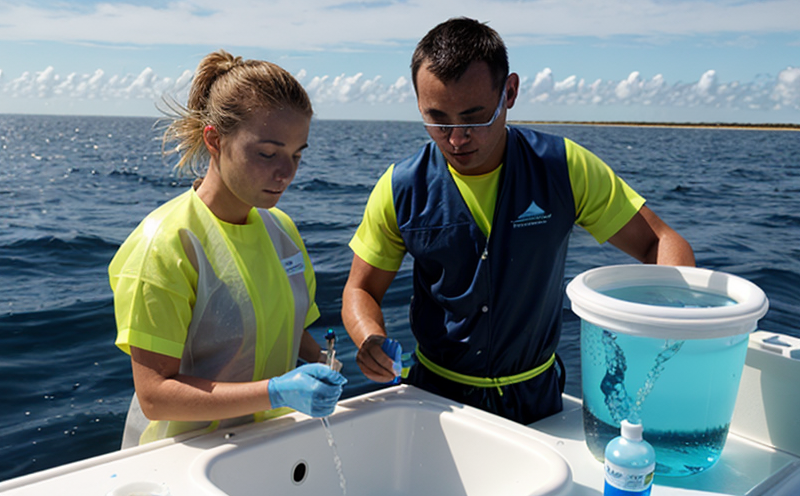ASTM D7066 Petroleum Hydrocarbons Test in Seawater
The ASTM D7066 test method is specifically designed to determine petroleum hydrocarbon concentrations in seawater. This critical measurement is essential for environmental monitoring and compliance with international standards, particularly when assessing the impact of oil spills or other hydrocarbon discharges into marine environments.
Seawater contains a complex mix of organic compounds, including those derived from natural sources such as phytoplankton and algae, as well as anthropogenic pollutants. The presence of petroleum hydrocarbons (PHCs) in seawater can have significant ecological impacts, affecting aquatic life and marine ecosystems. Accurate measurement is crucial to understanding the extent of contamination and guiding remediation efforts.
The ASTM D7066 method is based on the principle that PHCs are non-polar hydrocarbons that do not form stable emulsions with water. This characteristic allows for a more accurate determination of PHC concentrations by extracting these compounds into a solvent phase and measuring their volume in the extract.
The test involves several key steps, including sampling seawater from specified depths and locations, filtering the sample to remove particulate matter, and then extracting the hydrocarbons using a solvent. The extracted hydrocarbons are then analyzed by gas chromatography (GC) with flame ionization detection (FID). This approach ensures that only non-polar compounds are measured, providing a more accurate representation of petroleum hydrocarbon contamination.
The ASTM D7066 standard is widely recognized for its rigorous methodology and high reliability. It specifies the use of hexane as the extraction solvent and provides detailed instructions on sample preparation, extraction conditions, and analytical techniques. The method also includes quality control measures to ensure consistent results across different laboratories.
Understanding the hydrocarbon content in seawater is crucial for various stakeholders, including regulatory bodies, environmental organizations, and industry sectors involved in maritime operations. By providing accurate and reliable data on petroleum hydrocarbon concentrations, ASTM D7066 supports informed decision-making and compliance with environmental regulations.
Applied Standards
The ASTM D7066 test method is widely applied in various sectors where the presence of petroleum hydrocarbons in seawater needs to be monitored. These include:
- Maritime and shipping industries, particularly for vessels involved in oil transportation or operations near sensitive marine environments.
- Oil and gas exploration and production activities that could lead to accidental spills into the ocean.
- Offshore drilling platforms and rigs where hydrocarbon discharges are a concern.
The standard is also used in environmental impact assessments for projects involving coastal development or construction near marine areas. Compliance with ASTM D7066 ensures that stakeholders adhere to international best practices and regulatory requirements related to hydrocarbon discharge into seawater.
Scope and Methodology
The scope of the ASTM D7066 test method covers the determination of petroleum hydrocarbons in seawater samples. The methodology is designed to ensure accurate extraction and quantification of non-polar hydrocarbon compounds, which are indicative of petroleum contamination.
The key steps in the ASTM D7066 procedure include:
- Sampling: Seawater samples are collected at specified depths using standardized sampling devices. The location and depth of sampling are crucial to ensure representative data.
- Filtration: Samples are filtered through 0.7 μm membrane filters to remove particulate matter, ensuring that only dissolved hydrocarbons are measured.
- Extraction: The filtered seawater is then extracted with hexane in a Soxhlet apparatus for several hours. This step ensures complete extraction of petroleum hydrocarbons from the sample.
- Analytical Determination: The extract is analyzed by gas chromatography equipped with flame ionization detection (GC-FID). This technique provides precise quantification of the extracted hydrocarbons.
The ASTM D7066 method also includes detailed quality control measures, such as replicate analyses and spiked sample checks, to ensure the reliability and accuracy of the results. These steps are essential for maintaining consistent and reproducible measurements across different laboratories.
Eurolab Advantages
Eurolab offers unparalleled expertise in ASTM D7066 seawater testing, providing clients with a comprehensive range of services to meet their specific needs. Our advantages include:
- Advanced Facilities: We boast state-of-the-art laboratories equipped with the latest analytical instruments for precise and reliable measurements.
- Experienced Staff





